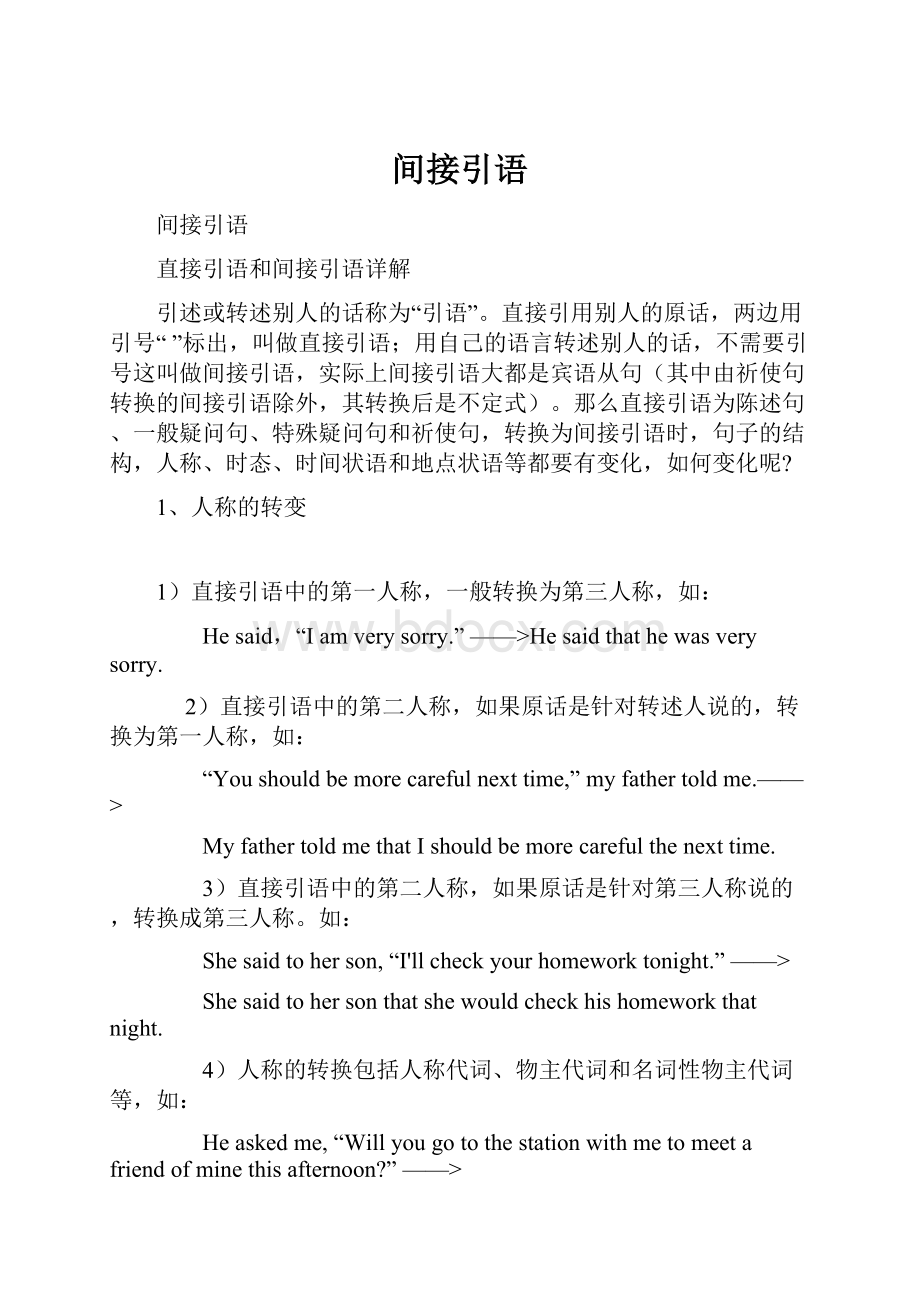间接引语.docx
《间接引语.docx》由会员分享,可在线阅读,更多相关《间接引语.docx(12页珍藏版)》请在冰豆网上搜索。

间接引语
间接引语
直接引语和间接引语详解
引述或转述别人的话称为“引语”。
直接引用别人的原话,两边用引号“”标出,叫做直接引语;用自己的语言转述别人的话,不需要引号这叫做间接引语,实际上间接引语大都是宾语从句(其中由祈使句转换的间接引语除外,其转换后是不定式)。
那么直接引语为陈述句、一般疑问句、特殊疑问句和祈使句,转换为间接引语时,句子的结构,人称、时态、时间状语和地点状语等都要有变化,如何变化呢?
1、人称的转变
1)直接引语中的第一人称,一般转换为第三人称,如:
Hesaid,“Iamverysorry.”——>Hesaidthathewasverysorry.
2)直接引语中的第二人称,如果原话是针对转述人说的,转换为第一人称,如:
“Youshouldbemorecarefulnexttime,”myfathertoldme.——>
MyfathertoldmethatIshouldbemorecarefulthenexttime.
3)直接引语中的第二人称,如果原话是针对第三人称说的,转换成第三人称。
如:
Shesaidtoherson,“I'llcheckyourhomeworktonight.”——>
Shesaidtohersonthatshewouldcheckhishomeworkthatnight.
4)人称的转换包括人称代词、物主代词和名词性物主代词等,如:
Heaskedme,“Willyougotothestationwithmetomeetafriendofminethisafternoon?
”——>
HeaskedmewhetherIwouldgotothestationwithhimtomeetafriendofhisthatafternoon.
总之,人称的转换不是固定的,具体情况,具体对待,要符合逻辑。
2、时态的转换
直接引语改为间接引语时,主句中的谓语动词如果是过去时,从句(即间接引语部分)的谓语动词在时态方面要作相应的变化,变成过去时范畴的各种时态(实际也是宾语从句的时态要求),变化如下:
直接引语
间接引语
一般过去时
过去完成时
现在进行时
过去进行时
现在完成时
过去完成时
过去完成时
过去完成时(不变)
过去进行时
过去进行时
一般将来时
过去将来时
指示代词、时间状语、地点状语和动词的变化
直接引语
间接引语
指示
this
that
代词
these
those
时
now
then
间
today
thatday
状
thisweek(month,etc.)
thatweek(month,etc.)
语
yesterday
thedaybefore
thedaybeforeyesterday
lastweek(year,etc.)
twodaysbefore
theweek(year,etc.)before
情态动词的时态转换
can
could
may
might
must
must\hadto
shall
should
例如:
“Iamverygladtovisityourschool”,shesaid.——>
Shesaidshewasverygladtovisitourschool.
Tomsaid,“Wearelisteningtothepopmusic.”——>
Tomsaidthattheywerelisteningtothepopmusic.
Motherasked,“HaveyoufinishedyourhomeworkbeforeyouwatchTV?
”——>
MotheraskedmewhetherIhadfinishedmyhomeworkbeforeIwatchedTV.
Heaskedtheconductor,“WhereshallIgetofftochangetoaNo.3bus?
”——>
HeaskedtheconductorwherehewouldgetofftochangetoaNo.3bus.
“Whydidsherefusetogothere?
”theteacherasked.——>
Theteacheraskedwhyshehadrefusedtogothere.
Motheraskedme,“HadyoufinishedyourhomeworkbeforeyouwatchedTV?
”——>
MotheraskedmewhetherIhadfinishedmyhomeworkbeforeIwatchedTV.
Tomsaid,“Wewerehavingafootballmatchthistimeyesterday.”——>
Tomsaidthattheywerehavingafootballmatchthattimethedaybefore.
Hesaid,“Ihaven'theardfrommyparentsthesedays.”——>
Hesaidthathehadn'theardfromhisparentsthosedays.
3、直接引语变成间接引语时,从句时态无须改变的情况
1)当主句的谓语动词是一般现在时的时候,如:
Healwayssays,“Iamtiredout.”——>Healwayssaysthatheistiredout.
2)当主句的谓语动词是将来时的时候,如:
Hewillsay,“I'lltrymybesttohelpyou.”——>Hewillsaythathewilltryhisbesttohelpme.
3)当直接引语部分带有具体的过去时间状语时,如:
Hesaid,“Iwenttocollegein1994.”——>Hetoldusthathewenttocollegein1994.
4)当直接引语中有以when,while引导的从句,表示过去的时间时,如:
Hesaid,“WhenIwasachild,Iusuallyplayedfootballafterschool.”——>
Hesaidthatwhenhewasachild,heusuallyplayedfootballafterschool.
5)当直接引语是客观真理或自然现象时,如:
Ourteachersaidtous,“Lighttravelsfasterthansound.”——>
Ourteachertoldusthatlighttravelsfasterthansound.
6)当引语是谚语、格言时,如:
Hesaid,“Practicemakesperfect.”——>Hesaidthatpracticemakesperfect.
7)当直接引语中有情态动词should,would,could,hadbetter,wouldrather,might,must,oughtto,usedt-o,need时,如:
例如:
Thedoctorsaid,“You'dbetterdrinkplentyofwater.”——>
ThedoctorsaidI'dbetterdrinkplentyofwater.
Hesaid,“Shemustbeateacher.”——>Hesaidthatshemustbeateacher.
Hesaid,“Sheoughttohavearrivedherofficebynow.”——>
Hesaidthatsheoughttohavearrivedherofficebythen.
Theteachersaid,“Youneedn'thandinyourcompositionstoday.”——>
Theteachersaidweneedn't/didn'tneedto/didn'thavetohandinourcompositions.
Sheasked,“MustItakethemedicine?
”——>Sheaskedifshehadtotakethemedicine.
〔注〕:
此处用hadto代替must更好
8)此外转述中的变化要因实际情况而定,不能机械照搬,如果当地转述,here不必改为there,动词come不必改为go,如果当天转述yesterday,tomorrow,thisafternoon等均不必改变。
如:
Teacher:
Youmayhavetheballgamethisafternoon.
Student:
Whatdidtheteachersay,Monitor?
Monitor:
Hesaidwemighthavetheballgamethisafternoon.
4、时间状语、地点状语及某些对比性的指示代词和动词变化
1)时间状语:
直接引语间接引语直接引语间接引语
now(then);tomorrow(thenext/followingday)
today(thatday);nextweek(thenext/followingweek/month/year)
yesterday(thedaybefore)twodaysago(twodaysbefore)
lastweek/month/year(theweek/month/yearbefore)thisweek/month/year(thatweek/month/year)
2)指示代词:
these变成those
3)地点状语:
here变成there
Shesaid,“Iwon'tcomehereanymore.”——>Shesaidthatshewouldn’tgothereanymore..
4)动词:
come变成go,bring变成take
5、直接引语变成间接引语,句子结构的变化
1)陈述句。
用连词that引导,that在口语中常省略。
主句的谓语动词可直接用引语中的said,也可用told来代替,注意,可以说saidthat,saidtosb.that,toldsb.that,不可直接说toldthat,如:
Hesaid,“IhavebeentotheGreatWall.”——>HesaidtousthathehadbeentotheGreatWall.
Hesaid,“I'llgiveyouanexaminationnextMonday.”——>
HetoldusthathewouldgiveusanexaminationthenextMonday.(不可说toldthat)
此外主句中的谓语还常有:
repeat,whisper,answer,reply,explain,announce,declare,think等,又如:
Hesaid,“I'mlatebecauseoftheheavytraffic.”——>Heexplainedtousthathewaslatebecauseoft-heheavytraffic.
如果间接引语是由that引导的两个或两个以上的并列从句,第一个连词可以省略,以后的连词一般不省略,以免混乱。
Thedoctorsaid,“Youarenotseriouslyill,Youwillbebettersoon.”——>
Thedoctorsaid(that)IwasnotseriouslyillandthatIwouldbebettersoon.
2)直接引语为一般疑问句,(也称是否疑问句,)间接引语用连词whether或if引导,原主句中谓语动词sai-d要改为asked(me/him/us等),语序是陈述句的语序,这一点非常重要。
Hesaid,“Doyouhaveanydifficultywithpronunciation?
”——>
Heasked(me)whether/ifIhadanydifficultywithmypronunciation.
Hesaid,“YouareinterestedinEnglish,aren'tyou?
”——>
HeaskedwhetherIwasinterestedinEnglish.
3)直接引语为选择疑问句,间接引语用whether…or…表达,而不用if…or…,也不用either…or….如:
Heasked,“DoyouspeakEnglishorFrench?
”——>
HeaskedmewhetherIspokeEnglishorFrench..
Iasked,“Willyoutakebusortaketrain?
”——>
Iaskedhimwhetherhewouldtakebusortaketrain.
4)直接引语为特殊疑问句,改成间接引语时,原来的疑问词作为间接引语的连词,主句的谓语动词用ask(sb.)来表达,语序改为陈述句语序。
如:
Heasked,“What'syourname?
”——>Heasked(me)whatmynamewas.
Heaskedus,“Howmanycarfactorieshavebeenbuiltinyourcountry?
”——>
Heaskedushowmanycarfactorieshadbeenbuiltinourcountry.
5)直接引语为祈使句时,改为间接引语,用带to的不定式表达,谓语动词常是ask,advise,tell,warn,orde-r,request等。
如asksb.todo,(由肯定祈使句变成)asksb.nottodo(由否定祈使句转变),并且在不定式短语中的时间状语、地点状语、人称及时态都作相应的变化。
如:
Hesaid,“Beseated,please.”——>Heaskedustobeseated.
“Dobecarefulwithyourhandwriting.”Hesaid.——>
Hetoldmetobecarefulwithmyhandwriting.
“Nevercomehereagain!
”saidtheofficernearby.——>
Theofficerorderedthevillagersnevertogothereagain.
“Don'ttouchanythinginthelabwithoutpermission,”theteachersaid.——>
Theteacherwarnedthestudentsnottotouchanythinginthelabwithoutpermission.
6)有些含有“建议”——>、“劝告”——>的祈使句,可用suggest,insist,offer等动词转述,如:
Hesaid,“Let'shavearest.”——>Hesuggestedourhavingarest.
Hesaid,“Letmehelpyou.”——>Heofferedtohelpme.
7)当直接引语形式上是疑问句,有表示请求,建议意义时,可用asksb.todosth./suggestdoing/advises-b.todosth.等形式转述。
如:
“Wouldyoumindopeningthedoor?
”heasked.——>Heaskedmetoopenthedoor.
“Whynotgoingoutforawalk?
”heaskedus.——>
Headvisedustogooutforawalk.或Hesuggestedwegooutforawalk.
8)直接引语是感叹句时,变间接引语可用what或how引导,也可用that引导,如:
Shesaid,“Whatalovelydayitis!
”——>Shesaidwhatalovelydayitwas.或Shesaidthatitwasalov-elyday.
嵌套间接引语的从句:
如果间接引语当中还镶嵌有另一句从句,则被称为嵌套间接引语的从句,英文叫:
thesubordinateclausei-nindirectstatement。
这时,这样的从句要使用虚拟语气。
从句动词的时态与主句动词的时态相关联。
如:
Duxdicebatmilitemquifugissetpoenasdaturumesse.统帅曾常说,那个逃跑的士兵将要受到惩罚。
quifugisset[逃跑]是一句关系从句,修饰militem“士兵”,由于处在dicebat[说]后面的间接引语当中,因此需使用虚拟语气。
间接引语的动词是不定式daturumesse[将受到],为将来时,因为动作发生在主句动词“说”之后,而fugisset[逃跑]为虚拟语气的过去完成时,表示在统帅“说话”之前已经逃走了
如何把直接引语变间接引语
“一随主”是指在直接引语变间接引语时,如果从句中的主语是第一人称或被第一人称所修饰。
从句中的人称要按照主句中主语的人称变化如:
Shesaid."Mybrotherwantstogowithme."→Shesaidherbrotherwantedtogowithher.
“二随宾”是指直接引语变间接引语时,若从句中的主语及宾语是第二人称。
或被第二人你所修饰。
从句中的人称要跟引号外的主句的宾语一致。
如果引号外的主句没有宾语。
也可以用第一人称,如:
HesaidtoKate."Howisyoursisternow?
"→HeaskedKatehowhersisterwasthen。
“第三人称不更新”是指直接引语变间接引语时。
如果从句中的主语及宾语是第三人称或被第三人称所修饰从句中的人称一般不需要变化如:
MrSmithsaid。
"Jackisagoodworker。
"→MrSmithsaidJackwasagoodworker。
变时态:
直接引语在改为间接引语时、时态需要做相应的调整。
现在时它需改为过去时态;过去时态改为完成时;过去完成时则保留原来的时态。
如:
1)Shesaid."Ihavelostapen."→Shesaidshehadlostapen
2)Shesaid."Wehopeso."→Shesaidtheyhopedso.
3)Shesaid."Hewillgotoseehisfriend。
"→Shesaidhewouldgotoseehisfriend。
但要注意在以下几种情况下。
在直接引语变为间接引语时,时态一般不变化。
①直接引语是客观真理。
"Theearthmovesaroundthesunandthemoonmovesaroundtheearth,theteachertoldme.→Thete-achertoldmetheearthmovesaroundthesunandthemoonmovesaroundtheearth。
②直接引语是过去进行时,时态不变。
如:
Jacksaid."John,wherewereyougoingwhenImetyouinthestreet?
"→JackaskedJohnwherehewasg-oingwhenhemethiminthestreet。
③直接引语中有具体的过去某年、某月、某日作状语,变为间接引语时,时态不变。
如:
XiaoWangsaid."IwasbornonApril2l,1980。
"→XiaoWangsaidhewasbornonApril20,1980。
④直接引语如果是一般现在时。
表示一种反复出现或习惯性的动作,变间接引语,时态不变。
如:
Hesaid,"Igetupatsixeverymorning。
"→Hesaidhegetsupatsixeverymorning。
⑤如果直接引语中的情态动词没有过去时的形式(例:
oughtto,hadbetter,usedto)和已经是过去时的形式时,(例:
could,should,wou